| Home |

|
William
Minerd |
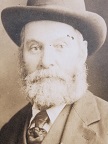 |
| William Minerd |
William Minerd was born on Sept. 20, 1840 at Wharton Furnace, Fayette County, PA, the son of James and Sarah (Walters) Minerd Sr. He and his brother James Jr. were twins, and they were among a large number of our cousins to serve in the same Civil War regiment -- the 85th Pennsylvania Volunteer Infantry.
As a young man, William stood 5 feet, 6 inches tall. He weighed 145 lbs, with a dark complexion.
In April 1860, at the age of 20, William married 21-year-old Sara "Elizabeth" Whoolery (April 2, 1839-1926), the daughter of William and Sarah (Rankin) Whoolery. The ceremony was held at William Whoolery's home near Hopwood, by the hand of Abraham Hayden, a justice of the peace.
They produced a family of eight children -- Mary Ann Crayton Cross, Thomas Minerd, Charles "Milton" Minerd, Sarah E. Crawford, Frances Jeffries Cross, Mariah J. Minerd, James "William" Minerd and Jennie W. Herrington Worrick.
Daughter Mariah's fate is unknown.
A few months after the Civil War broke out, William enlisted in the Union Army on Sept. 6, 1861, along with brothers James and Isaac. All three were assigned to the 85th Pennsylvania Infantry, Company I. In doing so, he left behind his wife and a baby daughter.
William was a "messmate" of Isaac's and they were "almost always together" in the regiment. They saw heavy action in the battle of Fair Oaks/Seven Pines, VA, on May 30-31, 1862. The 85th later took part in the Seven Days' Battle, and was stationed at various locations in Virginia and North Carolina.
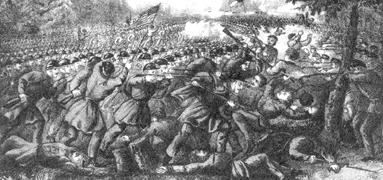 |
| Battle of Fair Oaks -- from an old Currier & Ives print |
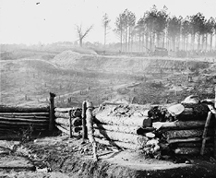 |
| Bermuda Hundred fort |
William and his brothers were in camp at Bermuda Hundred, VA, in the summer of 1864. Seen here is a rare wartime view of the federal earthworks at Bermuda Hundred, on the left of the line near Point of Rocks.
On June 13, 1864, William was wounded in a freak accident in the Bermuda Hundred fortifications. While "climbing on the fortifications, having his gun in hand, and having hold of the bayonet, the trigger of the gun caught in a...hole of the breastwork and discharged [the] gun." William "called the corporell and he came to my relief. The corporell was the neardest one being present at the time." His brother Isaac later said:
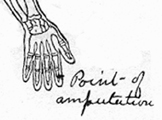 |
| Sketch of William's wound |
I was close by when [he] received the gun shot wound that took off a part of the index finger of his left hand. I heard the report of the gun, saw him in a few minutes afterward while his finger was still bleeding. We were messmates and were almost always together as much so as soldiers could be under the circumstances.
The ball lodged in the first joint of the index finger of William's left hand, causing a compound fracture. Dr. S.L. Kurtz of the regiment amputated the finger and dressed the wound. Over time, the wound healed, forming a "good smooth stump."
About five months later, William was discharged and mustered out of his regiment at Pittsburgh on Nov. 22, 1864.
After the war, the Minerds lived at Mt. Braddock, Lemont Furnace, Brownfield Coke Works (1890-99) and Smithfield, Fayette County, where he worked as a farmer but mostly as a coal miner. Because of his wartime wound, he said, the finger was too short to enable him to grasp firmly either a shovel or pick.
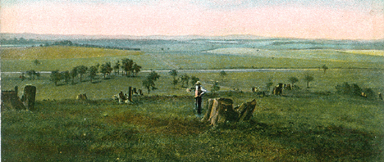 |
|
Flat farm fields in and around Mt. Braddock -- at the farm eastern edge of the famed Connellsville coal fields -- in the years before mining operations took over the area. |
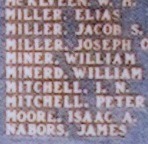 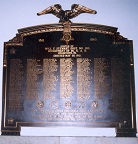 |
| Fayette County Courthouse |
Today, William's name is listed on a prominent plaque at the Fayette County courthouse in Uniontown. The plaque recognizes his membership in the William F. Stewart Post of the Grand Army of the Republic (GAR), a veterans organization. (Note -- the name "William Miner" directly above is a soldier not yet proven to be of our family. See our "Do They Fit?" page.)
William was a strong family man, and cared for his adult children when they faced troubles. He stood for daughter Mary Ann when she divorced her husband Henry Crayton in 1896. He took in daughter Jennie when her husband Albert Herrington was killed in Hawaii in 1899, and daughter Fannie when she divorced Hugh J. Jeffries in 1904. He also provided a home for son James "William" Minerd who was widowed at age 19 after only a month of marriage to Lizzie Bennington.
The Minerds kept a family Bible, into which they inscribed the names and birthdates of each of their seven children. The Bible was examined and copied in December 1919 by Henry O'Neil, a justice of the peace. A typewritten page with the names/birth dates today is on file in William's Army pension file in the National Archives in Washington, DC.
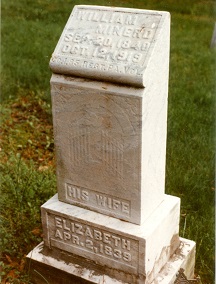 |
| Hopwood Cemetery |
During the winter of 1908-1909, William suffered from a severe case of pneumonia, and was treated by Dr. W.T. Messmore, and recovered. Though he lived until 1919, he began enduring a series of physical ailments in the 1910s. Dr. Messmore stated the following after one examination:
He cannot hear an ordinary conversation at any distance. He cannot hear a watch tick when held against either ear. By shouting at him he can hear at a distance of 5 to 8 feet. His mental condition is not of the best, at times, he forgets almost every thing that he even knew.
William suffered what today would be called Alzheimer's Disease. Circa 1913, he resided with his daughter and son in law, Mary Ann and Patrick H. Cross, and the disease had already affected his mind. The Aug. 23, 1913 Connellsville Daily Courier reported that William got himself into trouble and that Patrick:
... went in search of his father-in-law William Minerd Thursday, who left his home in Uniontown Monday in the midst of the storm that prevailed and has not been heard of since. Mr. Minerd but recently moved from [Smithfield] where he had lived for a number of years to the home of his daughter in Uniontown from where he disappeared. He was nearly 80 years old and of late was afflicted at times by an aberration of mind. It is feared by his family that while in one of these lapses he wandered around and possibly fell in a coal hole of which there are many in the vicinity of the home of his daughter, and perished.
In his final years, William resided with the Crosses at their home in Woodbridgetown, near Smithfield. He suffered paralysis which left him disabled for the final three years of his life. He died at midnight on Oct. 12, 1919, at the age of 79. Son in law P.H. Cross stood beside the bed as he slipped away, and daughter Mary Cross signed the official Pennsylvania certificate of death. Funeral arrangements were made by O.S. Vance of Smithfield.
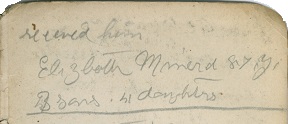 |
| Record of Elizabeth's funeral in the prayer book of her husband's cousin, Rev. David E. Minerd |
He was laid to rest in one of the many Minerd plots at Hopwood Cemetery near Uniontown. (William's adult children and his brother Morris, father James and grandfather Henry Minerd also are buried there, along with many aunts, uncles and cousins.) The funeral was conducted by William's first cousin, Rev. David Ewing Minerd, the famed "Blacksmith Preacher" of Fayette County.
Elizabeth outlived him by seven years. In 1920, she was awarded her husband's Civil War pension of $25 per month. In reporting on the pension issue, the Daily Courier noted that she was "a war widow in the true sense, having been married to Mr. Minerd at Hopwood in April, 1860... Mrs. Minerd, who is in very feeble health, makes her home with her son-in-law and daughters, Mr. and Mrs. H.P. Cross."
Suffering from kidney failure and uremic poisoning, she passed away at the age of 86 on Feb. 18, 1926. She was laid to rest beside her husband.
| Copyright © 1994, 2000-2005, 2008, 2019 Mark A. Miner |
|
Bermuda Hundred photograph courtesy of the American Memory Project of the Library of Congress. |